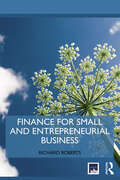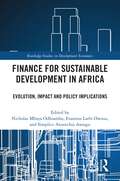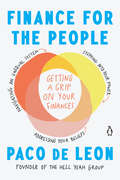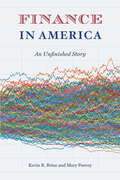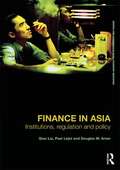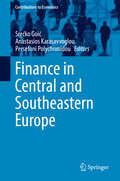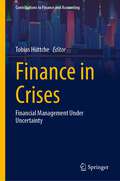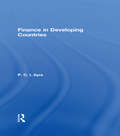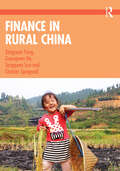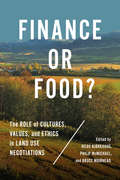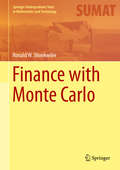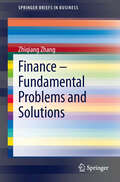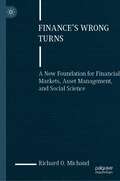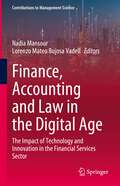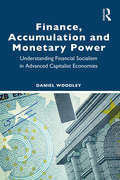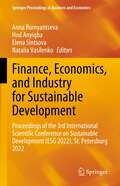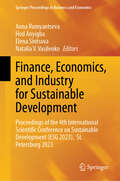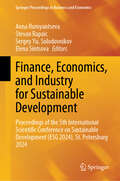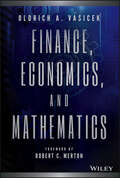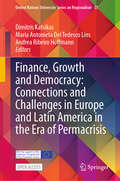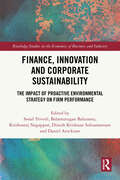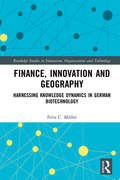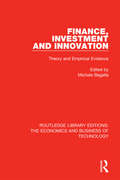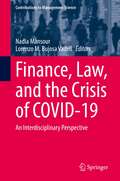- Table View
- List View
Finance for Small and Entrepreneurial Business (Routledge Masters in Entrepreneurship)
by Richard RobertsThe financial environment of small and entrepreneurial firms is changing rapidly and is a topic where significant disagreement remains amongst researchers and policy advisers. This concise textbook provides a comprehensive overview of the current and projected trends in this market for the benefit of students of entrepreneurship at an advanced level. Written by an expert on SME finance, it provides a straightforward review of the external funding choices faced by small business owners, drawing on a range of new data sources which have emerged in recent years, along with a range of case studies. In addition, it includes an analysis of longer term trends and the role of the changing phases of the business cycle to equip readers to better understand the wider market environment both now and in the future. Roberts provides students of entrepreneurship with everything they need to know to excel in understanding the financial environment and its effect on small business.
Finance for Sport and Leisure Managers: An Introduction
by Robert Wilson John JoyceSport and leisure managers need to understand the financial side of their industry to offer the most cost-effective facilities and to make sound business decisions. However, to the non-expert the language and practice of finance is often bewildering and perceived as complicated, difficult and impenetrable. This textbook guides the reader throu
Finance for Sustainable Development in Africa: Evolution, Impact and Policy Implications (Routledge Studies in Development Economics)
by Nicholas Mbaya Odhiambo Erasmus Larbi Owusu Simplice Anutechia AsonguAlthough a number of selected African countries have made efforts to implement various financial sector reforms, many countries have not fully implemented the requisite reforms required for sustainable development. Instead, they have focused mainly on bank-based financial reforms, thereby neglecting market-based financial reforms. This study provides a one-stop shop for understanding the history and evolution of the financial sector in Africa with a special focus on the sub-Saharan region where the financial system in many countries is still at a relatively nascent stage. The analysis is extensive and robust, and starts from financial repression to financial liberalisation (both internal and external), and its role in sustainable development and poverty alleviation. The book covers a range of important research issues pertaining to financial development in selectede African countries, including interest rate and exchange rate reforms, the dynamics of bank-based and market-based financial development; the role of the informal financial sector in sustainable development; the finance-growth nexus; bank-based versus market-based financial sectors in Africa; financial development and information and communication technology; and financial development and gender equality, among other topics. The book also considers the relationship between the COVID-19 global pandemic and financial development, and concludes by presenting a forecast of the future trends of financial and sustainable development on the African continent in general and sub-Saharfan Africa in particular. The chapters are authored by prominent scholars and researchers in the field of finance and banking, applied econometrics and development economics, with a deep understanding and knowledge of financial development and the local situations in African countries. This book provides crucial reference material for academics, researchers, policymakers and students of all levels and is a must-read for anyone wishing to understand the nature of finance and sustainable development in Africa in relation to the rest of the world. It covers African countries, but with more emphasis on the sub-Saharan African region where the financial systems in many of the countries are still relatively underdeveloped.
Finance for the People: Getting a Grip on Your Finances
by Paco de LeonAn illustrated, practical guide to navigating your financial life, no matter your financial situationWe are all weird about money. Whether you have a lot or a little, your feelings and beliefs about money have been shaped by a combination of silence (or even shame) around talking about money, personal experiences, family and societal expectations, and a whole big complex system rigged against many of us from the start. Begin with that baseline premise and it&’s no surprise so many of us find it so difficult to save enough money (but way too easy to get trapped in ballooning credit card debt), emotionally draining to deal with student loans, and nearly impossible to understand the esoteric world of investing. Unlike most personal finance books that focus on skills and behaviors, FINANCE FOR THE PEOPLE asks you to examine your beliefs and experiences around money—blending extremely practical exercises with mindfulness, and including more than 50 illustrations and diagrams to make the concepts accessible (and even fun). With deep insider expertise from years spent in many different corners of the financial industry, Paco de Leon is a friendly, approachable, and wise guide who invites readers to change their relationship with money. With her holistic approach you&’ll learn how to: • root out your unconscious beliefs about money • untangle the mental and emotional burden of student loans to pay them off • use a gratitude practice to help you think differently about spending • break out of the debt cycle and begin building wealth This book is for anyone who feels unseen, ignored, or bored to death by the way personal finances are approached and taught, and is ready to go on a journey of self-discovery and step into their financial power.
Finance in America: An Unfinished Story
by Kevin R. Brine Mary PooveyThe economic crisis of 2008 led to an unprecedented focus on the world of high finance—and revealed it to be far more arcane and influential than most people could ever have imagined. Any hope of avoiding future crises, it’s clear, rest on understanding finance itself. To understand finance, however, we have to learn its history, and this book fills that need. Kevin R. Brine, an industry veteran, and Mary Poovey, an acclaimed historian, show that finance as we know it today emerged gradually in the late nineteenth century and only coalesced after World War II, becoming ever more complicated—and ever more central to the American economy. The authors explain the models, regulations, and institutions at the heart of modern finance and uncover the complex and sometimes surprising origins of its critical features, such as corporate accounting standards, the Federal Reserve System, risk management practices, and American Keynesian and New Classic monetary economics. This book sees finance through its highs and lows, from pre-Depression to post-Recession, exploring the myriad ways in which the practices of finance and the realities of the economy influenced one another through the years. A masterwork of collaboration, Finance in America lays bare the theories and practices that constitute finance, opening up the discussion of its role and risks to a broad range of scholars and citizens.
Finance in Asia: Institutions, Regulation and Policy (Routledge Advanced Texts in Economics and Finance)
by Douglas W. Arner Qiao Liu Paul LejotAsia’s demand for second-generation financial institutions and markets needs to be met in order for the region’s further development to be sustained. This book provides a compelling, fact-based assessment of current practices and regulations in Asia’s financial institutions and markets and carefully documents the exciting opportunities and challenges that lie ahead in the region’s financial systems. This book differs in design from typical treatments of financial institutions and markets because its focus is on Asia rather than using the US model (in terms of market configurations or products) as a benchmark, and its takes a contemporary and forward-looking view of financial markets. Examples of practice from Asia are used to illustrate major accepted themes in finance and financial regulation. To the extent that Asia’s main economies share characteristics that are distinct, for example, in the relationship between government and the banking sector, or in aspects of corporate governance, the book will discuss the consequences for market operation and intermediation. The book’s carefully structured facts and rigorously argued analysis carry important implications both for students in business and law and for professionals new to financial markets in Asia. It will change the way that Asian financial markets and institutions is taught in universities as well as provide a valuable resource for professionals working in finance in Asia.
Finance in Central and Southeastern Europe
by Anastasios Karasavvoglou Persefoni Polychronidou Srećko GoićThis book describes specific problems and proposes solutions for different areas of finance in Central and Southeastern European countries. Covering a broad spectrum of topics, from monetary economics and electronic money to capital markets, banking and insurance, it comprises theoretical and empirical contributions by authors from nine countries - Poland, Slovakia, Croatia, Bosnia and Herzegovina, Romania, Bulgaria, Montenegro, Serbia and Greece. Intended for academics as well as policy makers and practitioners it offers new perspectives on Central and Southeastern European finance research.
Finance in Crises: Financial Management Under Uncertainty (Contributions to Finance and Accounting)
by Tobias HüttcheClimate change, COVID-19, Ukraine: it seems that crises are here to stay, which poses major challenges for the financial management of companies. This book addresses these issues, and present concrete approaches to resolving them.Until recently, the past was considered a reliable basis for predicting the future. As this is no longer the case, financial calculation and management models must take uncertainty into account. This affects the entire discipline of financial management, whether it is the valuation of goodwill in accounting, the estimation of capital costs in company valuation, or the strategic controlling of an international group of companies. There are three main challenges to be overcome: first, uncertainty must be integrated into traditional models, then uncertainty must be quantified, and lastly, potential developments must be modelled. This requires not only a deep understanding of the respective field, but also the ability to suitably adapt traditional models and techniques. This volume discusses these issues and offers new insights into how financial management will evolve in light of the current developments.
Finance in Developing Countries
by P.C.I. AyreFirst Published in 1977. This issue of the Journal is devoted to papers dealing with various features of the financial process in developing countries progress. While the majority of papers included deal with various aspects of the domestic financial system, a paper is included which lies in the field of international finance and there are two papers within the field of public finance as conventionally defined.
Finance in Rural China
by Xingyuan Feng Christer Ljungwall Guangwen He Tongquan SunThis book offers insights into the scholarly debates on formal and informal finance in rural China and fills a gap in the existing literature. The book provides an overview of the overall development of rural finance in China and explains the necessity of embarking on the pathway toward rural financial pluralization through the "Local Knowledge Paradigm". The authors also analyze formal and informal financial development and inclusive finance (including digital inclusive finance) in rural China in various dimensions. This book aids the understanding of the structure of the rural financial system and the operations of rural financial service providers in China. It will be a useful reference for those researching and interested in rural economy and rural finance.
Finance or Food?: The Role of Cultures, Values, and Ethics in Land Use Negotiations
by Philip McMichael Hilde Bjørkhaug Bruce MuirheadExploring the ways in which culture, systems of value, and ethics impact agriculture, this volume addresses contemporary land questions and conditions for agricultural land management. Throughout, the editors and contributors consider a range of issues, including pressure on farmland, international and global trade relations, moral and ethical questions, and implications for governance. The focus of Finance or Food? is land use in Australia, Canada, and Norway, chosen for their commonalities as well as their differences. With reference to these specific national contexts, the contributors explore political, ecological, and ethical debates concerning food production, alternative energy, and sustainability. The volume argues that recognition of food, finance, energy, and climate crises is driving investments and reframing the strategies of development agencies. At the same time, food producers, small farmers, and pastoralists facing eviction from their land are making their presence felt in this debate, not just locally, but in national policy arenas and international fora as well. This volume investigates the many ways in which this process is occurring and draws out the cultural implications of new developments in global land use. An important intervention into a timely debate, Finance or Food? will be essential reading for both academics and policymakers.
Finance with Monte Carlo
by Ronald W. ShonkwilerThis text introduces upper division undergraduate/beginning graduate students in mathematics, finance, or economics, to the core topics of a beginning course in finance/financial engineering. Particular emphasis is placed on exploiting the power of the Monte Carlo method to illustrate and explore financial principles. Monte Carlo is the uniquely appropriate tool for modeling the random factors that drive financial markets and simulating their implications. The Monte Carlo method is introduced early and it is used in conjunction with the geometric Brownian motion model (GBM) to illustrate and analyze the topics covered in the remainder of the text. Placing focus on Monte Carlo methods allows for students to travel a short road from theory to practical applications. Coverage includes investment science, mean-variance portfolio theory, option pricing principles, exotic options, option trading strategies, jump diffusion and exponential Lévy alternative models, and the Kelly criterion for maximizing investment growth. Novel features: inclusion of both portfolio theory and contingent claim analysis in a single text pricing methodology for exotic options expectation analysis of option trading strategies pricing models that transcend the Black-Scholes framework optimizing investment allocations concepts thoroughly explored through numerous simulation exercises numerous worked examples and illustrations The mathematical background required is a year and one-half course in calculus, matrix algebra covering solutions of linear systems, and a knowledge of probability including expectation, densities and the normal distribution. A refresher for these topics is presented in the Appendices. The programming background needed is how to code branching, loops and subroutines in some mathematical or general purpose language. The mathematical background required is a year and one-half course in calculus, matrix algebra covering solutions of linear systems, and a knowledge of probability including expectation, densities and the normal distribution. A refresher for these topics is presented in the Appendices. The programming background needed is how to code branching, loops and subroutines in some mathematical or general purpose language. Also by the author: (with F. Mendivil) Explorations in Monte Carlo, ©2009, ISBN: 978-0-387-87836-2; (with J. Herod) Mathematical Biology: An Introduction with Maple and Matlab, Second edition, ©2009, ISBN: 978-0-387-70983-3.
Finance – Fundamental Problems and Solutions
by Zhiqiang ZhangAs indicated by the title, this book focuses on fundamental problems in finance: a logical dilemma in valuation, stock valuation methods/models, risk valuation, and optimal capital structure. It presents an innovative approach to logic and quantitative reasoning (without advanced mathematics) that delivers valuable results ---- convincing solutions to these problems. Readers in finance will definitely be interested in these solutions as well as the methods. In fact, these fundamental problems are essential in the field of finance, and they have remained unsolved (or partly unsolved) for decades. The solutions offered in this book are all sound in theory and feasible in practice, and will hopefully benefit both theoretic al research and practical decision-making.
Finance's Wrong Turns: A New Foundation for Financial Markets, Asset Management, and Social Science
by Richard O. MichaudThere is a foundational crisis in financial theory and professional investment practice: There is little, if any, credible evidence that active investment strategies and traditional institutional quantitative technologies are able to provide superior risk-adjusted, cost-adjusted return over investment relevant horizons. Economic and financial theory has been in error for more than fifty years and is the fundamental cause of the persistent ineffectiveness of professional asset management. Contemporary sociological and economic theory, agent-based modeling, and an appreciation of the social context for preference theory provides a rational and intuitive framework for understanding financial markets and economic behavior. The author narrates his long-term experience in the use and limitations of traditional tools of quantitative asset management as an institutional asset manager in practice and as a quantitative analyst and strategist on Wall Street. Monte Carlo simulation methods, modern statistical tools, and U.S. patented innovations are introduced to redefine portfolio optimality and procedures for enhanced professional asset management. A new social context for expected utility theory leads to a novel understanding of modern equity markets as a financial intermediary for purchasing power constant time-shift investing uniquely appropriate for meeting investor long-term investment objectives. This book addresses the limitations and indicated resolutions for more useful financial theory and more reliable asset management technology. In the process, it traces the major historical developments of theory and institutional asset management practice and their limitations over the course of the 20th century to the present, including Markowitz and the birth of modern finance, CAPM theory and emergence of institutional quantitative asset management, CAPM and VM theory limitations and ineffective iconic tools and strategies, and innovations in statistical methodologies and financial market theory.
Finance, Accounting and Law in the Digital Age: The Impact of Technology and Innovation in the Financial Services Sector (Contributions to Management Science)
by Nadia Mansour Lorenzo Mateo Bujosa VadellThis book focuses on understanding Innovation in the Financial Services Sector. The collection of contributions gathered in the book highlights the importance of technology contexts that pertain to Finance, accounting, and the law arena. The respective chapters address topics such as Economic development, social entrepreneurship, Online Behaviour, Digital entrepreneurship, and Islamic banks. All contributions are based on the latest empirical and theoretical research and provide key findings and concrete recommendations for scholars, entrepreneurs, organizations, and policymakers.
Finance, Accumulation and Monetary Power: Understanding Financial Socialism in Advanced Capitalist Economies
by Daniel WoodleyThis accessible yet rigorous book examines the development of ‘financial socialism’ in advanced capitalist economies in the decade since the global financial crisis of 2007–2009. This new term refers to an attempt to resolve the accumulation crisis of capital through coordinated central bank activism, where state circuits of monetary capital assume a critical role in the reproduction of capitalist social relations. The book explains the dynamics of the crisis as it has developed and assesses the response of monetary elites to systemic financial risk in the global economy. Their failure to re-engineer growth following the technology boom of the late 1990s and the global financial crisis are driving fundamental changes in the form and function of capitalist money, which have yet to be theorized adequately. Finance, Accumulation and Monetary Power presents a revealing and radical critique of the failure of the International Political Economy to apprehend changes taking place within capitalism, employing a critical-theoretical analysis of contradictions in the capitalist reproduction scheme. The book will be of key interest to scholars, students and readers of international political economy, critical political economy, heterodox economics, globalization, international relations, international political sociology, business studies and finance.
Finance, Economics, and Industry for Sustainable Development: Proceedings of the 3rd International Scientific Conference on Sustainable Development (ESG 2022), St. Petersburg 2022 (Springer Proceedings in Business and Economics)
by Anna Rumyantseva Hod Anyigba Elena Sintsova Natalia VasilenkoThis volume presents the proceedings of the 3rd International Scientific Conference on Sustainable Development (ESG 2022), St. Petersburg 2022. It discusses strategic approaches and relevant decisions of business, government, and civil society to achieve the Sustainable Development Goals (SDG), which were adopted by all UN member states in 2015. At present, the economies of different countries are in a zone of turbulence and the current agenda pushes the transformation of all customary systems to maintain and keep the achieved positions. The need to implement the agenda of sustainable development and achieve the SDGs is implemented through the socio-economic development strategies of countries with low greenhouse gas emissions, opportunities for green and transitional projects are considered, the issue of disclosure of non-financial reporting is widely studied, which can provide additional signal to business about the framework of sustainability in a changing world, as well as prospects for implementation of social and managerial business initiatives within the SDGs.The economies of various countries are currently in a zone of turbulence, and the current agenda is pushing for the transformation of all customary systems to maintain and sustain the positions achieved. The need to implement the sustainable development agenda and achieve the SDGs is being realized through the socio-economic development strategies of countries with low greenhouse gas emissions, opportunities for green and transitional projects are being considered, non-financial reporting disclosure is being widely studied, which can provide an additional signal to business about the sustainability framework in a changing world, and prospects for social and managerial business initiatives under the SDGs.This volume brings together material on sustainable development in economics and finance as well as industry. It is intended for scholars and professionals involved in public and corporate finance, financial accounting and auditing, sustainable development risk management, as well as economic growth, macroeconomics, monetary policy in a sustainable development environment, public and corporate governance and economics, corporate communications and public relations.
Finance, Economics, and Industry for Sustainable Development: Proceedings of the 4th International Scientific Conference on Sustainable Development (ESG 2023), St. Petersburg 2023 (Springer Proceedings in Business and Economics)
by Anna Rumyantseva Hod Anyigba Elena Sintsova Natalia V. VasilenkoThis volume discusses strategic approaches and relevant decisions of business, government, and civil society to achieve the Sustainable Development Goals (SDG), which were adopted by all UN member states in 2015. The book presents the proceedings of the 4th International Scientific Conference on Sustainable Development (ESG 2023), St. Petersburg 2023. At present, the economies of different countries are in a zone of turbulence and the current agenda pushes the transformation of all customary systems to maintain and keep the achieved positions. This volume brings together material on sustainable development in economics and finance as well as industry. It is intended for scholars and professionals involved in public and corporate finance, financial accounting and auditing, sustainable development risk management, as well as economic growth, macroeconomics, monetary policy in a sustainable development environment, public and corporate governance and economics, corporate communications and public relations.
Finance, Economics, and Industry for Sustainable Development: Proceedings of the 5th International Scientific Conference on Sustainable Development (ESG 2024), St. Petersburg 2024 (Springer Proceedings in Business and Economics)
by Anna Rumyantseva Elena Sintsova Stevan Rapaic Sergey Yu. SolodovnikovThis book explores business and governance solutions for achieving the Sustainable Development Goals (SDGs), adopted by all UN member states in 2015. It features the proceedings of the 5th International Scientific Conference on Sustainable Development (ESG 2024), held in St. Petersburg in 2024. Without adequate funding to invest in sustainable development and the transformation of energy and food systems, countries and companies cannot achieve stable financial positions. To meet the SDGs, all nations and businesses must invest in renewable energy, universal social protection, quality education, decent jobs, universal health coverage, sustainable food systems, infrastructure, and digital transformation. Incentives for SDG achievement address financing needs through a combination of various forms and mechanisms. Implementing these incentives will also necessitate broader changes in both national and international financial architectures. The book covers a range of fields, including sustainable development for the national and global economy, sustainable development in industrial and financial policy, financing sustainable transformations in industry, finance, and management, sustainable development principles in tax systems, and impact of sustainable development on financial markets among other topics. The book is intended for scholars and professionals involved in public and corporate finance, financial accounting and auditing, sustainable development risk management, economic growth, macroeconomics, monetary policy within a sustainable development environment, public and corporate governance, as well as corporate communications and public relations.
Finance, Economics, and Mathematics
by Robert C. Merton Oldrich A. VasicekThe compiled works of the man behind the evolution of quantitative finance Finance, Economics, and Mathematics is the complete Vasicek reference work, including published and unpublished work and interviews with the man himself. The name Oldrich A. Vasicek is synonymous with cutting-edge research in the finance fields, and this book comes straight from the source to bring you the undiluted mother lode of quant wisdom from one of the founders of the field. From his early work in yield curve dynamics, to the mean-reverting short-rate model, to his thoughts on derivatives pricing, to his work on credit risk, to his most recent research on the economics of interest rates, this book represents the life's work of an industry leader. Going beyond the papers, you'll also find the more personal side inspirational as Vasicek talks about the academics and professionals who made lasting impressions and collaborated, debated, and ultimately helped spawn some of his greatest thinking. Oldrich Vasicek has won virtually every important award and prize for his groundbreaking research in quantitative finance. You've followed his work for years; this book puts it all in a single volume to give you the definitive reference you'll turn to again and again. Explore Vasicek's insights on topics he helped create Discover his research and ideas that have gone unpublished--until now Understand yield curves and the Vasicek model from the source himself Gain a reference collection of some of the most influential work in quantitative finance Vasicek's research is the foundation of one of the most important innovations in finance. Quants around the world have been influenced by his ideas, and his status as thought leader is cemented in the annals of finance history. Finance, Economics, and Mathematics is the definitive Vasicek reference every finance professional needs.
Finance, Growth and Democracy: Democracy, Finance, and Growth (United Nations University Series on Regionalism #33)
by Dimitris Katsikas Andrea Ribeiro Hoffmann Maria Antonieta Del Tedesco LinsThe present volume uses a comparative regional approach to analyze how permacrisis—an extended period of instability and insecurity—has been experienced and dealt with in the European Union (EU) and Latin America. Written by academicians and policy experts from both regions, the volume has three main objectives. Firstly, it critically evaluates the response of regional organizations and governments in the EU and Latin America to the crises that have shaken these regions in recent years. Secondly, chapters contribute to a better understanding of the promised benefits and risks of digital currencies and fintech more generally to economic growth, financial stability and inclusion. Finally, the volume promotes an understanding of the challenges of permacrisis in both the EU and Latin America, as well as encouraging their cooperation at the multilateral and bi-regional levels. Providing an interdisciplinary perspective, this volume will be of interest to researchers and students of international relations, international political economy, international finance and economics, international law, global governance, and regionalism, as well as public officials of ministries of foreign affairs, finance and the economy, public officials of international and regional organizations. This is an open access book.
Finance, Innovation and Corporate Sustainability: The Impact of Proactive Environmental Strategy on Firm Performance (Routledge Studies in the Economics of Business and Industry)
by Balamurugan Balusamy Daniel Arockiam Sonal Trivedi Krishnaraj Nagappan Dinesh Krishnan SubramaniamThis book explores how the problem of global sustainability could turn into a major force for innovation leading to enhanced firm performance. It addresses whether proactive environmental strategy and innovation are integrated with a firm’s performance. The goal of this book is to advance the rapidly developing field of sustainable business beyond the straightforward logic of cost, waste and risk reduction.The authors offer significant insight into how internal—life cycle design—and external—image and reputation—innovation strategies serve to mediate and possibly reinforce one another by investigating the relationship between proactive environmental strategy and innovation in relation to firm performance. The book includes empirical research, case studies and real-world examples as well as lessons learned from the successful and unsuccessful transformation initiatives of numerous international companies.This book is primarily aimed at an academic audience of scholars, researchers and advanced students in the fields of finance, economics, sustainability, innovation and environmental studies and will also appeal to practitioners and industry experts in these areas.
Finance, Innovation and Geography: Harnessing Knowledge Dynamics in German Biotechnology (Routledge Studies in Innovation, Organizations and Technology)
by Felix C. MüllerThe overarching aim of Finance, Innovation and Geography: Harnessing Knowledge Dynamics in German Biotechnology is to explore linkages between geographies of finance and relational geographies of innovation. This is achieved by questioning how investment activities affect the unfolding of innovations and in turn are affected by it. This book focuses on biotechnology innovation processes from the perspective of relational economic geography. It reconstructs the unfolding in time and space of eight innovations in German biotechnology. Each one is represented in a qualitative case study. The analysis focuses on the relational work of building, transforming, ending and replacing of collaborative relationships and organizational arrangements surrounding emergent innovations ・ including investment relations and relational work by investors. In this way, the contribution of investors to unfolding innovations is studied with sensitivity to context and situated interactions. The geography of these dynamics is conceptualized by drawing on the recent literature on relational proximity and distance as well as ideas of materiality and space. This book provides a unique perspective, and shows that innovation paths are strongly interwoven with local and temporary opportunities as well as crises, and that investment is embedded in these dynamics. This is essential reading for students and academics of both economics and innovation.
Finance, Investment and Innovation: Theory and Empirical Evidence (Routledge Library Editions: The Economics and Business of Technology #4)
by Michele BagellaThis book provides a critical evaluation of the literature on finance, investment and innovation and proposes new research methods for evaluating the comparative performance of financial systems in supporting innovation. The comparative advantage of this book is that of being directly focused on one of the main unsolved issues in monetary and financial economics: the relative effectiveness of national financial systems in supporting innovation. It proposes various theoretical and empirical contributions that, taken together, allow to evaluate the relative effectiveness of some of the most important country systems such as Japan, and the UK and Italy.
Finance, Law, and the Crisis of COVID-19: An Interdisciplinary Perspective (Contributions to Management Science)
by Nadia Mansour Lorenzo M. Bujosa VadellThis book analyzes the impact of Covid-19 in different areas such as corporate social responsibility and legislation in SMEs, insolvency law, behavioral finance, government interventions in markets, financial disclosure, the emergence of unregulated financial sectors, the increase of coronavirus-related crimes, and the development of banking regulations in the Covid-19 pandemic, among others.The coronavirus epidemic, which has spread throughout the world, has highlighted the inadequacies of the health and social systems of all states, even the most advanced. The health emergency has required extraordinary measures, especially at the level of laws that are essential for the preservation of lives, health, and livelihoods. The priority for governments and even the international community was, from the outset, to prevent infections and care for those affected. Such a strategy required an unusual increase in health spending, even though it exceeded the State's financial capacity and lacked fiscal space. In addition to this challenge, which has not yet been overcome, there is another, that of redressing the consequences of the measures taken (general containment). It should be pointed out that during health crises, the state may have to review the requirement for transparency because of the emergency, but not free itself from it. The urgency could never be an alibi for a violation of citizens' rights and freedoms.With urgency, financial management systems must be flexible and responsive to all occurrences, while ensuring optimal use of resources and minimizing the risks of fraud and corruption.
